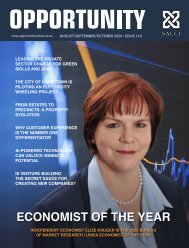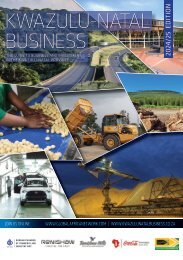South African Business 2018 edition
Welcome to the sixth edition of the South African Business journal. First published in 2011, the publication has established itself as the premier business and investment guide to South Africa, supported by an e-book edition at www.southafricanbusiness.co.za. Regular pages cover all the main economic sectors of the South African economy and give a snapshot of each of the country’s provincial economies. Feature articles on topical issues such as sustainability and African trade provide unique insights, together with an interview with the newly elected chairman of the African Association of Automotive Manufacturers, Mr Thomas Schaefer. Another special feature focusses on an exciting project to transform South Africa’s small harbours and coastal properties. South African Business is complemented by nine regional publications covering the business and investment environment in each of South Africa’s provinces. The e-book editions can be viewed online at www.globalafricanetwork.com. First published in 2011, the publication has established itself as the premier business and investment guide to South Africa, supported by an e-book edition at www.southafricanbusiness.co.za Regular pages cover all the main economic sectors of the South African economy and give a snapshot of each of the country’s provincial economies. Feature articles on topical issues such as sustainability and African trade provide unique insights, together with an interview with the newly elected chairman of the African Association of Automotive Manufacturers, Mr Thomas Schaefer. Another special feature focusses on an exciting project to transform South Africa’s small harbours and coastal properties. South African Business is complemented by nine regional publications covering the business and investment environment in each of South Africa’s provinces. Visit www.globalafricanetwork.com for more business and investment news, opportunities and events.
Welcome to the sixth edition of the South African Business journal. First published in 2011, the publication has established itself as the premier business and investment guide to South Africa, supported by an e-book edition at www.southafricanbusiness.co.za.
Regular pages cover all the main economic sectors of the South African economy and give a snapshot of each of the country’s provincial economies. Feature articles on topical issues such as sustainability and African trade provide unique insights, together with an interview with the newly elected chairman of the African Association of Automotive Manufacturers, Mr Thomas Schaefer. Another special feature focusses on an exciting project to transform South Africa’s small harbours and coastal properties.
South African Business is complemented by nine regional publications covering the business and investment environment in each of South Africa’s provinces. The e-book editions can be viewed online at www.globalafricanetwork.com.
First published in 2011, the publication has established itself as the premier business and investment guide to South Africa, supported by an e-book edition at www.southafricanbusiness.co.za
Regular pages cover all the main economic sectors of the South African economy and give a snapshot of each of the country’s provincial economies. Feature articles on topical issues such as sustainability and African trade provide unique insights, together with an interview with the newly elected chairman of the African Association of Automotive Manufacturers, Mr Thomas Schaefer. Another special feature focusses on an exciting project to transform South Africa’s small harbours and coastal properties.
South African Business is complemented by nine regional publications covering the business and investment environment in each of South Africa’s provinces. Visit www.globalafricanetwork.com for more business and investment news, opportunities and events.
You also want an ePaper? Increase the reach of your titles
YUMPU automatically turns print PDFs into web optimized ePapers that Google loves.
SPECIAL FEATURE<br />
committed investments into mostly solar and wind<br />
power. The programme stalled when energy utility<br />
Eskom baulked at paying for power it said it didn’t<br />
need but the programme will restart in late 2017.<br />
Nobody does renewable energy more enthusiastically<br />
than Denmark and <strong>South</strong> Africa has entered<br />
into multiple agreements with the northern European<br />
country. Denmark is the world leader in wind power<br />
and a trend-setter in energy-efficiency building codes.<br />
According to the Danish Energy Association, the<br />
best instruments to achieve energy efficiency are<br />
building standards, equipment standards, obligation<br />
schemes for energy utilities, energy audits and tax<br />
rebates, and taxation. Architects and builders often<br />
get ahead of targets: in 2013, 30% of all new floorspace<br />
in Denmark was built to 2015 standards. In terms of<br />
energy per square metre, if the country continues to<br />
meet its targets, it will soon be at 6% of the norm in the<br />
1970s. When a Danish building is finished, an energy<br />
audit is done before it can be used.<br />
The Energy Efficiency Directorate in the <strong>South</strong><br />
<strong>African</strong> Department of Energy aims to optimise the<br />
energy sector through efficient use, production and<br />
consumption of energy resources. A Draft National<br />
Energy Efficiency Strategy was published in December<br />
2016.<br />
Among the directorate’s collaborations is one with<br />
Danish Energy Management and the International<br />
Energy Agency (IEA). An advisor from the Danish<br />
Energy Association has been seconded to <strong>South</strong> Africa<br />
as part of an inter-governmental energy partnership.<br />
The Danes have created an export industry out of<br />
their expertise in energy: in 2015 it was worth about<br />
R140-billion and they want to expand it to “at least”<br />
R280-billion by 2030.<br />
GreenCape’s report on <strong>South</strong> Africa’s waste market<br />
includes some references to broader economic opportunities<br />
in the sustainable economy. Some examples:<br />
Agriculture: solar-powered irrigation (SA market,<br />
R2.9-billion)<br />
Energy services: energy efficiency retrofitting; solar<br />
PV systems; local manufacturing<br />
Utility-scale renewable energy: independent power<br />
production; rest of Africa; local manufacturing<br />
Waste: private-public partnerships, construction<br />
and demolition waste; growing reuse and<br />
recycle market<br />
Secondary materials: growing market for plastics,<br />
metals and e-waste<br />
Water: industrial water reuse; recycling and<br />
resource recovery<br />
Food value retention: better cold chain management<br />
and waste reduction; solar thermal (in agri-processing,<br />
the SA market potential is R3.7-billion); biogas.<br />
TRANSITIONING INDUSTRY TO<br />
A LOW CARBON ECONOMY<br />
The Century City<br />
Conference Centre in Cape<br />
Town was host to more<br />
than 400 delegates from<br />
industry, business and<br />
government who gathered<br />
in September 2017 to discuss how to make<br />
industry and commerce cleaner, greener and<br />
more resource efficient.<br />
The biennial Industrial Efficiency Conference<br />
of the National Cleaner Production Centre<br />
<strong>South</strong> Africa (NCPC-SA) had as its theme,<br />
“Transitioning industry to a low carbon economy”<br />
and offered workshops, presentations<br />
and panel discussions on a range of resource<br />
efficient and cleaner production (RECP)<br />
methodologies.<br />
The two-day programme offered information<br />
on better use of energy, water, materials and<br />
waste, as well as analysis of legislation and<br />
policy that may affect business operations.<br />
The presentation of successful case studies<br />
formed an integral part of the conference.<br />
The NCPC-SA is a national programme, funded<br />
by the National Department of Trade and<br />
Industry and hosted by the Council for Scientific<br />
and Industrial Research (CSIR). It exists to support<br />
industrial companies to reduce their environmental<br />
impact through the use of RECP.<br />
The biennial conference is offered as one<br />
of these support mechanisms, which is why<br />
there is no cost for attendance. Both days included<br />
a non-commercial exhibition, allowing<br />
delegates to interact with government and<br />
industry programmes that may be of assistance.<br />
SOUTH AFRICAN BUSINESS <strong>2018</strong><br />
32


















